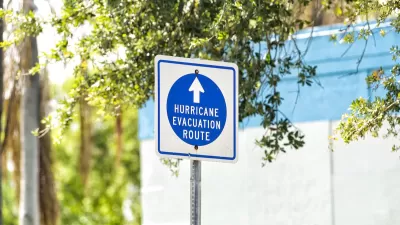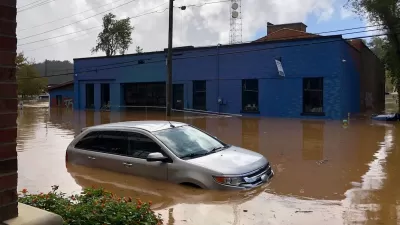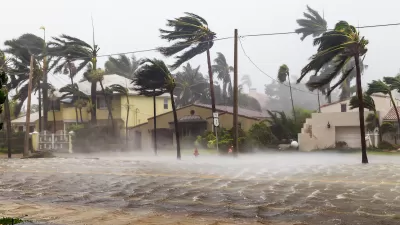Hurricane Matthew seemed to have hit a glancing blow on the southeastern seaboard over the weekend, until the floodwaters, and the death tolls, started to rise.
"Hurricane Matthew may have wandered out to sea, but the watery mess it left behind in North Carolina keeps getting worse and worse," reports Brad Plumer.
Plumer, writing on Tuesday, October 11, reports that floodwaters have been rising after the Hurricane dropped record amounts of rain on the state over the weekend.
In a separate article, Elena Gooray provides historic context for the rainfall:
The storm swept in by Hurricane Matthew has produced rainfall that exceeds the level expected about once every 1,000 years, according to a statistical analysis using National Oceanic and Atmospheric Administration data.
Moreover, researchers have already been able to connect the record floods with the effects of a warming climate:
The new rainfall records were enabled by warming in the ocean and coastal atmospheres, which hold more water as temperatures increase — with a few cities across the Southeast reporting record levels of air moisture during the storm.
Those kinds of epoch-defining rain levels were also witnessed in Louisiana several times earlier this year.
President Obama has declared both North Carolina and South Carolina as disasters. In September, Tim Dominick penned a prescient letter to the editors of The State, calling on South Carolina to improve dam safety, one year after destructive floods ravaged the state.
FULL STORY: North Carolina’s record floods: “you have got to see it to believe all the devastation that has occurred"

Planetizen Federal Action Tracker
A weekly monitor of how Trump’s orders and actions are impacting planners and planning in America.

Restaurant Patios Were a Pandemic Win — Why Were They so Hard to Keep?
Social distancing requirements and changes in travel patterns prompted cities to pilot new uses for street and sidewalk space. Then it got complicated.

Maui's Vacation Rental Debate Turns Ugly
Verbal attacks, misinformation campaigns and fistfights plague a high-stakes debate to convert thousands of vacation rentals into long-term housing.

In California Battle of Housing vs. Environment, Housing Just Won
A new state law significantly limits the power of CEQA, an environmental review law that served as a powerful tool for blocking new development.

Boulder Eliminates Parking Minimums Citywide
Officials estimate the cost of building a single underground parking space at up to $100,000.

Orange County, Florida Adopts Largest US “Sprawl Repair” Code
The ‘Orange Code’ seeks to rectify decades of sprawl-inducing, car-oriented development.
Urban Design for Planners 1: Software Tools
This six-course series explores essential urban design concepts using open source software and equips planners with the tools they need to participate fully in the urban design process.
Planning for Universal Design
Learn the tools for implementing Universal Design in planning regulations.
Heyer Gruel & Associates PA
JM Goldson LLC
Custer County Colorado
City of Camden Redevelopment Agency
City of Astoria
Transportation Research & Education Center (TREC) at Portland State University
Jefferson Parish Government
Camden Redevelopment Agency
City of Claremont





























